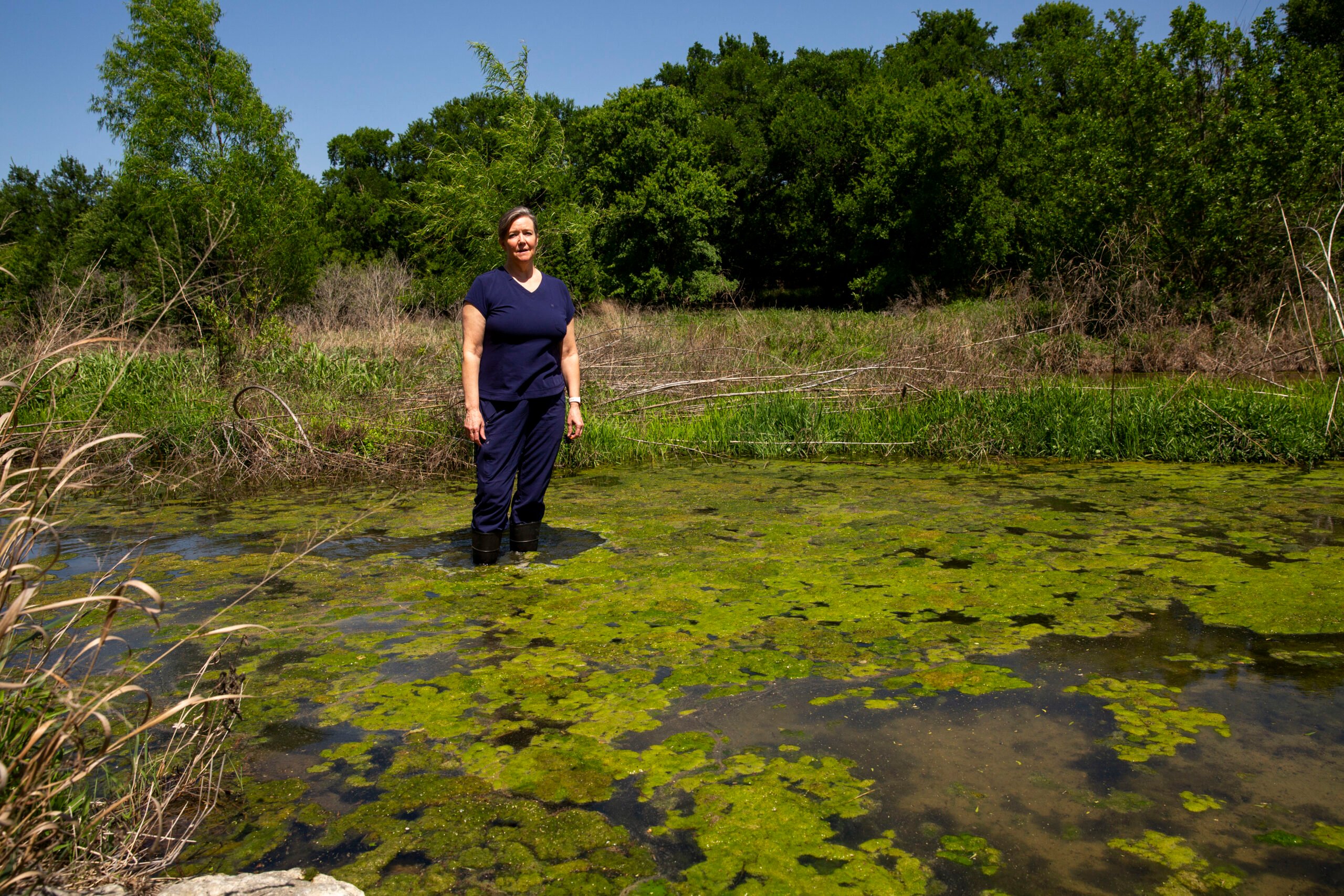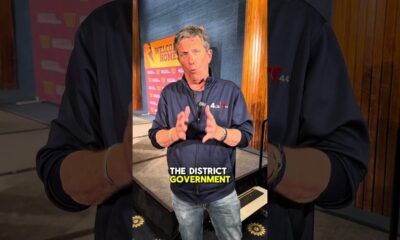News from the South - Texas News Feed
The long fight to allow new spending in the Texas speaker race
How a multi-year legal battle by allies of a billionaire megadonor set off this year’s explosive House Speaker race
“How a multi-year legal battle by allies of a billionaire megadonor set off this year’s explosive House Speaker race” was first published by The Texas Tribune, a nonprofit, nonpartisan media organization that informs Texans — and engages with them — about public policy, politics, government and statewide issues.
Sign up for The Brief, The Texas Tribune’s daily newsletter that keeps readers up to speed on the most essential Texas news.
A bruising election season had come and gone, but the political attacks kept rolling in.
Voters in state Rep. Cody Harris’ East Texas district were flooded with text messages the week before the legislative session kicked off. The barrage of attacks accused the Palestine Republican of colluding with Democrats to elect a speaker of the Texas House.
“A small group of Republican Texas House members are trying to cut a deal with a majority Democrat coalition to elect a speaker who will kill our conservative policies” said one text, which included a disclosure that it was paid for by the Republican Party of Texas. “Unfortunately, your Representative Cody Harris decided to ignore the Trump mandate and is working with the Democrats to stop the GOP nominee.”
Over the past year, outside groups spent heavily on campaigns for their speaker of choice, turning a race that is usually waged quietly and behind closed doors into a public and caustic spectacle that has raised allegations among its members of foul play.
State Rep. Dustin Burrows of Lubbock, the candidate most closely associated with prior House leadership, ultimately won. But the result came only after a deluge of spending made legally possible by a pair of lawsuits 14 years apart filed by close associates or allies of a chief Burrows’ adversary: West Texas oil billionaire Tim Dunn, who has for years funded an effort to disrupt the traditional Republican leadership of the House and push the chamber closer to his no-compromise, Christian conservative ideals.
As a result of the most recent lawsuit, the Texas Ethics Commission agreed in 2023 to stop enforcing laws that ban outside spending in the speaker’s race, cementing a ruling in the previous case that found the prohibition violated the First Amendment. The commission’s decision was made at the encouragement of Attorney General Ken Paxton’s office, which refused to represent the commission otherwise.
/https://static.texastribune.org/media/files/cd5b9fda4c1ba157c84cfb5ded56cde5/0528%20Dade%20Phelan%20Runoff%20MF%20TT%2012.jpg)
Rep. Dade Phelan, R-Beaumont, who dropped out of the race seeking his third term as speaker after enduring several months of a loud campaign against him, said the presence of outside spending marks a new era in the speaker’s race.
“Outside forces, folks who may not even live in the state of Texas or in the United States, are going to be able to exert pressure among members about their vote for speaker,” he told The Texas Tribune in an interview. “It’s just something we haven’t ever dealt with in the state of Texas.”
The lawsuits ushered in an open season on spending for attack ads. House members for months saw their districts bombarded with social media and text message campaigns, targeting them over their speaker allegiances.
“It was totally different,” said Rep. Gary VanDeaver, R-New Boston, who said every day leading up to the start of session his inboxes were full of messages threatening him if he didn’t vote for Burrows’ opponent in the race, Rep. David Cook, R-Mansfield. “We received thousands of phone calls and emails from all over the state, just really ugly voicemails left and it was totally out of hand.” In prior sessions, VanDeaver, who voted for Burrows, remembers only a few people expressing opinions about his vote for speaker.
/https://static.texastribune.org/media/files/77da37da434c9937a7d2ae590ae19184/TTF16%20Tim%20Dunn%20TT%20BB%2002%20Color%20Corrected.jpg)
Early financial reports show that allies and political groups funded by Dunn spent heavily in the last few months of 2024. The Republican Party of Texas, funded largely by Dunn in recent years, spent at least $163,000 on the speaker’s race. Dunn’s PAC, Texans United for a Conservative Majority, spent at least $43,000. At least one PAC supporting Burrows also spent nearly $60,000 in the last weeks of 2024. Dunn did not respond to an interview request.
Those numbers likely represent only a portion of the spending. It will be months before those groups are required to disclose their spending in the two weeks leading up to the vote. And the state’s weak ethics laws mean Texans may never know the total spent to influence this speaker vote.
Lawmakers have responded to the latest political warfare with lawsuits and legislation. Harris filed an ethics complaint against the chair of the Texas GOP, accusing him of bribery for threatening political retribution if he didn’t vote for Cook. (The ethics commission dismissed the complaint stating it wasn’t in their jurisdiction.)
Another Republican House member filed a lawsuit against a group he said published his cell phone number in a message to constituents that falsely alleged he supported Burrows. And other Republican lawmakers have filed bills to put more guardrails around mass text messages sent as part of political activity.
“It felt like a highly contentious primary runoff,” Harris said. “They tried to elevate the speakership to a statewide elected office and the reality is it’s not. It’s determined by 150 members of the Texas House. … This time they tried to completely disrupt that.”
Ethics reform in the wake of Sharpstown
/https://static.texastribune.org/media/files/ee9a6f5754d9ddefc89ee05fe0d6b62e/Gus%20Mutscher%20Preston%20Smith%20Lyndon%20Johnson%20Ben%20Barnes.jpeg)
In the early 1970s, political scandal rocked the Capitol after nearly two dozen Texas officials, including then-House Speaker Gus Mutscher Jr., were embroiled in what became known as the Sharpstown stock fraud scandal, where lawmakers were found to have passed legislation favorable to a Texas businessman in exchange for the opportunity to buy stock in his banking business.
Angry voters sent a largely new crop of lawmakers to Austin in 1973 with demands to restore public trust. Dubbed “The Reform Session,” the Legislature passed a sweeping set of ethics rules, including one bill barring legislators from using campaign money “to aid or defeat a speaker candidate,” and prohibiting individuals from spending more than $100 on correspondence that might influence the speaker’s election. The punishment was up to a year in jail, a $4,000 fine or both.
From then on, it would be almost unheard of for outsiders to get involved publicly in a House leadership race. Lawmakers considered the vote to be an internal legislative act — a matter of “housekeeping” — to be treated differently than an election for office.
But in 2008, a coalition of legal groups sued the Texas Ethics Commission over the prohibition. Among the plaintiffs was the Free Market Foundation and its president Kelly Shackelford. The Free Market Foundation eventually became the First Liberty Institute, of which Shackelford remains the president. Dunn has been a longtime board member.
At the time, their argument — that the ban on spending in the leadership race violated the First Amendment — had bipartisan support. Other plaintiffs included the Christian conservative Texas Eagle Forum and the American Civil Liberties Union.
“We were shocked that this would be in the law,” Shackelford said. “The speaker has a lot of power over pretty much every issue and to allow the general public to speak into that, I think, is important.”
Dunn has served on the board for more than two decades. Shackelford told The Texas Tribune that Dunn was not involved with the lawsuit.
Then U.S. District Judge Lee Yeakel, who was appointed by former President George W. Bush, ruled that lawmakers were too broad when they blocked outside spending in the speakers’ races.
“The election of the Speaker is not, therefore, a matter of internal Housekeeping,” wrote Yeakel in his ruling. “It is an issue of great political importance and a legitimate subject of public debate. Therefore, public speech relating to the election of the Speaker is subject to all the protections of the First Amendment.”
Empower Texans tests the waters
Yeakel’s ruling came around the same time that factions within the Texas GOP started to diverge. Moderate Republican Rep. Joe Straus of San Antonio rose to power in the House with the help of Democrats, a fact that conservative members of the party used against him in subsequent primaries.
Empower Texans, a conservative lobbying group funded largely by Dunn, started testing the waters, publicly advocating for their preferred speaker candidate. In 2011, they supported Ken Paxton, who was at that point a relatively unknown state representative from McKinney, in his campaign to unseat Straus as speaker. Paxton vowed to choose more conservative lawmakers to chair influential House committees.
/https://static.texastribune.org/media/files/39c6f41f8f01cf65e92a4d797525c7bd/Paxton%20Speaker%20Race%20MKC%20TT.jpeg)
/https://static.texastribune.org/media/files/ff5fa8086e6989168a34747a1a4c80fb/Burrows%20and%20Bonnen%20MKC%20TT%2001.jpg)
“This is the first time in modern history when Texans can express their preference on the speaker’s race and involve themselves in it,” Empower Texans wrote in a blog post in 2010. “Some in the Austin power elite – including the media – don’t like it.”
Paxton ultimately dropped out of the race, and Straus held on to the gavel. Throughout the rest of the decade, Empower Texans continued to attack House leaders, accusing them of being “Republican in Name Only,” and advocating for more conservative leadership in the lower chamber.
When Dennis Bonnen, an Angleton Republican, succeeded Straus as speaker in 2019, Empower Texans initially praised him. Then, the group began to complain that the new House leader — who was supposed to be more conservative than his predecessor — was compromising too much on key issues and ignoring their input.
Bonnen served one term as speaker, brought down by the leader of Empower Texans who released a secret recording where Bonnen and Burrows offered media credentials to the organization in exchange for his help to “pop” some House Republicans in the next primary.
Bonnen retired and the House handed the gavel to Rep. Dade Phelan of Beaumont, a Bonnen ally.
Only two representatives voted against Phelan for speaker, including former Rep. Bryan Slaton, R-Royce City, a freshman at the time. Slaton was bankrolled by Defend Texas Liberty, another Dunn-backed PAC that rose from the ashes of Empower Texans, which disbanded in 2020. Slaton was expelled from the Legislature in 2023 after a House investigation determined he had sex with a 19-year-old intern after giving her alcohol.
It was Slaton who took the Ethics Commission to court in late 2022 to once again challenge state statutes that prohibit outside spending in the speaker race. He and two other plaintiffs sued to remove a few remaining statutes that banned the practice. Slaton, Robert Bruce, a San Antonio conservative activist, and the Grayson County Conservatives PAC, argued that they wanted to spend campaign funds, personal money and PAC funds, respectively, to show support for a speaker candidate and state law was unconstitutionally prohibiting them from doing that.
/https://static.texastribune.org/media/files/22513d867c15fb1549a577d5ead1e96a/0425%20House%20Floor%20File%20TT%2029.jpg)
The group was represented by Tony McDonald, an Austin lawyer who served as the general counsel for Empower Texans and then Texas Scorecard, a conservative news website also funded by Dunn.
McDonald and Slaton declined to speak to the Tribune. Representatives from the PAC did not respond to requests for comment. Bruce said he joined the lawsuit because he felt the “good old boys” of the Texas House operated in the dark, and outside individuals and groups had a right to speak their mind about who should lead the lower chamber.
At the time, Burrows and Rep. Charlie Geren, R-Fort Worth, tried to intervene in the lawsuit to oppose Slaton’s case, arguing that the speaker’s race is a “legislative process.”
“If existing law is struck down, Intervenors will be subjected to the effects of limitless spending of political contributions to PACs and legislators on efforts to influence the selection of the Speaker of the House,” wrote Geren and Burrows. “This raises the prospect of influence-buying and corruption tainting the selection of the Speaker.”
But the attorney general’s office, led by Paxton, urged the ethics commission to settle, according to a letter from the Ethics Commission. Paxton is also one of the top recipients of Dunn’s campaign war chest, and he was one of the most vocal opponents of Burrows and Phelan in the speaker’s race.
The commission relented, writing in a letter to Geren in 2023 that the attorney general’s office would no longer represent it as a client in the case unless it settled. The attorney general’s office typically represents state agencies in lawsuits.
Phelan, the former House speaker, took issue with the attorney general’s role in the matter.
“When [Paxton was] elected to office he’s responsible for representing the state whether he agrees with the laws or not,” said Phelan, in an interview. “It’s still the job of that office and they chose not to do their duty to the taxpayers. Now, we are where we are.”
The attorney general’s office did not respond to a request for comment. But Bruce said Paxton’s decision to settle signaled they did not have a strong legal argument.
“There was no way it was going to stand constitutional muster,” he said. “It would’ve been pointless to have a trial because they knew they were going to lose, because it was a clear First Amendment violation.”
The RINO hunt continues
The state GOP’s decision to campaign against one of its own for House speaker this round was unusual. A review of campaign spending disclosures over the past 15 years leading up to the start of each legislative session shows the vast majority of spending by the party was to support Republican candidates. They had not previously spent money in the speaker’s race.
But in early December, Burrows announced he had the votes for speaker from a coalition of Republicans and Democrats just minutes after the GOP caucus voted in to endorse Cook, setting off off a feverish campaign against the now-speaker.
Party leadership accused Burrows of being a Democrat, spending tens of thousands of dollars on advertising and text message campaigns to pressure Burrows and his supporters to endorse Cook.
Dunn’s Texans United for a Conservative Majority PAC also sent text messages, urging voters to call their representatives and encourage them to “make the Texas House Republican again.”
In one message paid for by the PAC, Texas Agriculture Commissioner Sid Miller declared that the “RINO hunt in Texas continues.”
At the same time, a pro-Burrows group, American Opportunity PAC, spent around $60,000 in support of Burrows’ candidacy for speaker, according to the group’s most recent campaign disclosure.
The full scale of spending around the race is still unclear due to a patchwork of filing deadlines and a lack of specificity about what types of spending individuals or groups are required to disclose around this particular race.
“You’ve got an election that’s not really an election,” said Austin ethics lawyer Ross Fischer, of the speaker’s race. “It’s not a primary election. It’s not a runoff election. It’s not a general election. It’s in an entirely different statute. … It’s going to be up to the Legislature to decide whether they want to impose disclosure requirements for those involved in the speaker’s race.”
In one instance, a group called American Action Fund posted a Facebook ad in December asking people to sign a petition demanding their representative ”vote against liberal Dustin Burrows for speaker.” The group is not registered as a PAC with the state and had not filed a campaign expenditure report as of Feb 11. On American Action Fund’s Facebook page, it says it is run by Young Americans for Liberty Inc., which has not filed a report with the state for its political spending in 2024 either. Neither group responded to a request for comment.
Some House Democrats who were supporting Burrows, including Rep. Erin Zwiener, D-Driftwood, were also targeted by text message campaigns. The Courageous Conservatives PAC also sent a text to her constituents that included her personal cell, according to screenshots she provided to The Tribune. Another text message sent out accusing Zwiener of supporting “MAGA Republican Dustin Burrows” didn’t include a disclosure. It’s still unclear who sent that text.
That murkiness is at the heart of the lawsuit that Rep. Pat Curry filed against the Courageous Conservative PAC days after the speaker’s race. The freshman from Waco said the PAC, which is based in Virginia and chaired by Texas conservative Chris Ekstrom, sent a text message to his constituents claiming he had agreed to vote for Burrows for speaker, labeling him a “turncoat,” and publishing his phone number.
Curry said when his cell phone number was publicized, he was inundated with messages, some of them threatening. His family grew concerned for their safety. He sued, alleging the PAC violated Texas election laws by failing to register as a PAC with the Texas Ethics Commission.
He also reported the incident to the Texas Department of Public Safety, which is investigating the incident, according to the complaint.
Curry said the attacks were misplaced because he was supporting Cook all along. He thinks he was targeted by the group for not being more publicly supportive of their candidate.
“If they want you in their camp, they want you solidly in their camp,” Curry said in an interview. “And I wasn’t really willing to come out and jump out and scream on the corners for Cook.”
Ekstrom declined to comment on pending litigation but told the Tribune he is frustrated that allegations of so-called “dark money” controlling the House are betrayed by the fact that Burrows won.
“I think President Trump needs to get directly involved in 2026 & save Texas Conservatives from themselves, frankly,” he wrote in a message. “I have zero confidence in the current powers-that-be.”
As the legislative session continues, at least two lawmakers have filed a bill that would require “mass text message campaigns” to include a disclaimer identifying who paid for the political advertisement and slapping a $10,000 fine on each individual message sent that violates the disclosure law.
Rep. Greg Bonnen, R-Friendswood, and Sen. Lois Kolkhorst, R-Brenham, filed the identical legislation. Neither responded to a request for comment.
But the day after the bills were filed, McDonald, the lawyer who sued to help end the ban on outside spending in the speaker’s race, railed against the bill on social media.
“These bills don’t just impact ‘text messaging,’ he wrote. “They’re poorly conceived, and even more poorly drafted, and will have the effect of impacting speech rights for Texans of all stripes.”
This article originally appeared in The Texas Tribune at https://www.texastribune.org/2025/02/13/texas-speaker-race-house-tim-dunn-dustin-burrows/.
The Texas Tribune is a member-supported, nonpartisan newsroom informing and engaging Texans on state politics and policy. Learn more at texastribune.org.
News from the South - Texas News Feed
Dish Soap: The Versatile Cleaning Hero You Didn’t Know You Needed
SUMMARY: Dish soap is a versatile cleaning tool that goes beyond washing dishes. It can remove hair dye from skin, clean makeup brushes, reduce condensation on windows, stop squeaky doors, and even clear clogged drains. Dish soap works as a gentle insecticide for plants and is effective for cleaning various surfaces. Consumer Reports highlighted top picks, with Dawn Ultra praised for its suds and Gain Ultra Clean for affordability. However, dish soap shouldn’t be used in dishwashers or washing machines as it creates excess suds that can damage appliances. Additionally, excessive use on skin or hair can strip natural oils.

Discover the incredible versatility of dish soap, a kitchen staple that does more than just cut through grease. Consumer Reports unveils how this soapy superhero can tackle a variety of messes around your home, making it the secret weapon hiding in plain sight.
News from the South - Texas News Feed
Mostly cloudy, slight chance of storms west of SA tonight
SUMMARY:
Title: Mostly cloudy, slight chance of storms west of SA tonight.
Summary: Good Monday morning! I’m meteorologist Justin Horn sharing the forecast. Today will be mostly cloudy with temperatures near 90. Although there’s a slight chance of showers tonight due to potential storms from Mexico, it’s unlikely to impact the river parade. Tomorrow should remain quiet, but expect increased rain chances midweek, particularly Wednesday evening with possible strong thunderstorms. A 40% chance of rain is forecast for Wednesday, along with similar chances on Thursday and Friday. Stay weather-aware, especially with ongoing Fiesta events, but no need to cancel plans.

Better chances of rain by midweek.
News from the South - Texas News Feed
In Booming Central Texas, Wastewater Is Polluting Rivers and Streams
Editor’s Note: This article originally appeared at Inside Climate News, a nonprofit, independent news organization that covers climate, energy, and the environment. It is republished with permission. Sign up for their newsletter here.
Margo Denke set out to rally the town when she learned that a Christian youth camp planned to build a wastewater treatment plant and discharge its effluent into the pristine Hill Country creek that ran through her small ranch.
Denke, a 1981 graduate of Harvard Medical School who moved to the Hill Country in 2013, printed fliers, put them in Ziploc bags and tied them to her neighbors’ cattle gates in the tiny community of Tarpley, population 38. A coalition of families pooled resources, hired a lawyer and dug in for a yearslong battle.
Theirs was one of many similar struggles that have unfolded in recent years across Central Texas, where protection of creeks and rivers from treated wastewater discharge often falls to shoestring community groups as an onslaught of population growth and development pushes ever deeper into the countryside.
“All this would have been destroyed,” Denke said in April as she surveyed a spring-fed stretch of Commissioners Creek. “Raising the money to fight this is not easy. But you have to, you can’t let this just slide by.”
Eventually, the camp owner, who did not respond to a request for comment from Inside Climate News, agreed in settlement negotiations not to discharge into the creek. Instead, they would spray their treated effluent over their own property—an increasingly popular means of wastewater disposal. In exchange, the neighbors would drop their opposition to the two-story dam the camp erected for a private lake and waterpark on little Commissioners Creek.
“I’m trying to stay positive about it,” Denke said. “It was a huge win.”
But the battle never ends amid the rapid pace of development in Texas. Several miles downstream, another subdivision developer wants to treat wastewater and discharge it into Hondo Creek. And in a neighboring watershed, another community group recently stopped another Christian youth camp from discharging into the Sabinal River.
Similar stories repeat throughout Central Texas, where two decades of booming population growth have come with a massive increase in domestic wastewater—mostly human sewage. The effluent from wastewater treatment plants appears clean and clear, but it contains high levels of organic nutrients that can cause algae blooms and devastate native aquatic ecosystems when dumped into streams and rivers.

“Unfortunately, society at large has no idea,” said Jeff Back, a staff scientist at Baylor University who has studied nutrient pollution in Texas waterways for 20 years. “Developers want to continue to do their business, but they need to be responsible.”
Now, as the state Legislature meets for its biennial session, advocates for water protection are supporting a bill that would prohibit most new discharges of treated wastewater into the state’s last 21 stretches of pristine rivers and streams, as defined by measured nutrient levels. Filed by state Sen. Sarah Eckhardt, a Democrat from Austin, it’s the latest iteration of a bill that groups have tried repeatedly without success to pass in Texas.
It wouldn’t ban development along pristine streams. It would just require other outlets for treated wastewater beside the natural waterways. Plenty of solutions are available on the market, from systems for onsite re-use to treatment methods that remove the nutrients from wastewater.
“People have to understand that it’s not going to be free,” Back said. “People want to do everything as cheaply as possible.”
The luxury of doing things cheaply might not last forever. As Texas cities begin to outgrow their water supplies and state leaders increasingly recognize shortages looming on the horizon, there may come an end to the days of showering lawns with drinking water while dumping treated effluent into rivers for disposal.
“This effluent should be considered a resource, not a nuisance to get rid of,” said David Venhuizen, a civil engineer in Austin who sells hardware for on-site water reuse.
It could be used to irrigate and fertilize the turf grass of parks, sportsfields, golf courses and private lawns, which make up the bulk of municipal summertime water use in Texas. In existing cities, such reuse has proven prohibitively expensive because plumbing from wastewater treatment plants is expensive to run out to individual customers.
New development, however, could be built to incorporate on-site wastewater reuse, said Venhuizen. His system, buried underground like a septic system, can treat a household’s wastewater, then drip it beneath the lawn. It could also be adapted at neighborhood scale for subdivisions to create a decentralized network of wastewater treatment and local redistribution.
But the breathless pace of suburban sprawl in Texas leaves no time to pause and make systemic changes. Instead, Texas cities run pipelines to distant aquifers to meet the ever-growing needs of new neighborhoods that will use most of their drinking water on lawns while piping away their effluent for treatment and discharge into a creek.
“We’re going to continue to rely on extraction instead of any regenerative kind of water systems,” said Venhuizen, 78, on a rocking chair in his backyard fitted with rainwater collection tanks and covered in native plants. “The madness has to stop.”
Stephanie Morris bought a house on the South Fork San Gabriel River, 27 miles north of Austin, in 2013. She wouldn’t have done it if she knew what the beautiful river would become.
When she and her family moved in, Morris said, the neighbors were already exhausted by a long-running battle with the neighboring city of Liberty Hill over its discharge of treated wastewater into the river about a quarter mile upstream.
Back then, Liberty Hill had about 1,000 residents, and its discharge created relatively minor algae problems in the river. Then its population exploded, like many other small cities of Central Texas. Now almost 15,000 people live in Liberty Hill, most of them relying on the South Fork San Gabriel for their wastewater disposal needs.
“There’s a hell of a lot more people pissing in the pond,” said Morris, a high-risk labor and delivery nurse, as she trudged through the green, mucky river in high rubber boots. “Every year things would get worse as their volume increased.”
All those nutrients, primarily from human waste, have caused the riverbed to choke up entirely with algae at times, extending three to five miles downstream and burying native ecosystems. When the algae dies, it sinks and rots in heaps of black, stinking muck.
Year by year, Morris became increasingly involved, until she spent all of her free time trekking the riverbed and taking photos of the destruction to show to her elected representatives, commissioners of the TCEQ and judges at the administrative law courts in Austin.
As a result, the TCEQ has twice reduced the concentrations of phosphorus that the Liberty Hill plant is permitted to discharge, although its overall volume continues to increase. The river looks better today than it did several years ago, Morris said. But the fight has nearly exhausted her.
“This has cost so much time and money, it’s not even funny,” she said. “Private citizens should not have to be enforcing the environmental standards of the state.”
The story of the South Fork San Gabriel, and the pictures that circulated online, jolted other communities to fight against proposed discharges in their areas, said Annalisa Peace, executive director of the Greater Edwards Aquifer Alliance, a group that helps its member organizations challenge the proposed discharge permits in the 21 counties that overlie the Edwards and Trinity aquifers.
“It’s incumbent upon the citizens and GEAA to raise the money for the legal fees to do all this,” Peace said. “It seems to be that the burden is placed on the average citizen.”
Most new wastewater sources come from new housing subdivisions and the municipal utility districts that are established to serve them, she said. Others are commercial projects, from summer camps to music venues, that plan to treat their own wastewater. Much of the new construction, especially near pristine streams, takes place outside of any city’s jurisdiction so it faces little regulation or oversight.
Previous attempts to pass statewide regulations of discharges into waterways have repeatedly failed, said Peace, who has worked with GEAA for 20 years. Much of the resistance comes from lobbying by major homebuilding companies that are making big money off explosive population growth in Texas.
“It’s the big nationals that we’re really seeing the most intransigence and the most organized opposition from,” she said. “They don’t like regulation.”
The Texas Association of Builders declined to comment on this report.
Peace wishes for a law increasing treatment standards for wastewater discharge into all Texas waterways. But she’ll settle for the current bill, which protects just the remaining pristine segments, and provides exemptions for cities and river authorities.
Outside the Texas Legislature, groups have had more success challenging individual permits. Such was the case on the Upper Sabinal River, where another Christian youth camp, operated by the national nonprofit Young Life, proposed in 2019 to build a wastewater treatment plant that would discharge into the river. Local landowners rallied. They gathered 25,000 signatures on a petition and hired a lawyer to challenge the discharge permits.
Faced with an extensive delay in state administrative courts, Young Life opted to settle instead. Young Life did not respond to a request for comment.
“Once this became a high-profile issue, they were willing to look at alternatives,” said Jeff Braun, a landowner on the upper Sabinal River and a spokesperson for the Bandera Canyonlands Alliance, which fought the permit. “I think it hit a chord with a lot of people that are native Texans because they all love these iconic streams.”
In an announcement of the settlement agreement in August 2021, Young Life said it would reuse most of its wastewater on-site for irrigation rather than discharging into the river. Regulators call this practice “land application,” and it’s growing in popularity.
By banning discharges into pristine streams, the bill in the Legislature would effectively force developers in those areas to use land application for wastewater disposal. Although the practice is less impactful to waterways than direct discharge, it can still do damage.
Mike Clifford, technical director at the Greater Edwards Aquifer Alliance, said that opposition from community groups has already pushed many developers to seek land application permits.
“The problem now is we just have too many of these,” he said. “They’re popping up everywhere.”
The TCEQ has issued 413 active permits for land application of treated wastewater, according to online records, and 2,374 active permits for discharge.
For example, community groups are currently fighting a planned 10,000-seat amphitheater, luxury hotel and condominium complex on 84 acres nestled next to the Barton Creek Habitat Preserve on Barton Creek, a pristine stream, in Austin. The complex would treat its own wastewater with land application permits to spray up to 120,000 gallons per day of treated effluent onto its property.
Over time, Clifford said, the nutrient pollutants would accumulate until a big rainstorm washes them into Barton Creek. About five miles upstream, on Fitzhugh Road, another proposed 5,000-person music venue wants to treat its own wastewater and discharge it into ponds near Barton Creek.
One solution, Clifford said, would be for Texas to require developers to add nutrient removal to their treatment process.
“It’s just about money,” he said. Nutrient removal “can double the cost of a wastewater treatment plant.”
With adequate investment, plenty of solutions exist. Some could even be configured to make money that covers part of their costs. For example, some treatment systems that remove nitrogen and phosphorus from water do it by growing algae, which could be harvested and sold as fertilizer. To avoid the buildup of nutrients where effluent is sprayed onto land, grasses can be harvested and sold as hay. Irrigation of hay for livestock is the largest water demand driving shortages in parts of Texas and the West.
Eventually, water scarcity will compel urban planners to make use of wastewater rather than dumping into rivers, said Brian Zabcik, advocacy director for the Save Barton Creek Association, which has pushed for discharge protections on Texas pristine streams through several successive legislative sessions.
“It’s crazy that we’re using our highest-quality drinking water to water our lawns and flush our toilets,” he said. “It makes a lot more sense to use recycled wastewater for those purposes.”
Texas might soon have to consider systemic changes as its population continues to boom, temperatures continue to rise, a multi-year drought persists and water shortages approach. Already, changes are beginning in small pockets.
Zabcik pointed to West Texas cities of Big Spring and El Paso, national pioneers in the reuse of treated effluent for drinking water. In Austin, a new city government building features on-site wastewater treatment and recycling for non-potable uses. Consumer products exist to do the same at any home, building or neighborhood.
These aren’t radical practices, said Zabcik, who lives on his grandparents’ ranch in Bell County. Conserving water was part of life for previous generations in Texas. For example, Zabcik said, his grandparents grew a garden, but not with their drinking water; they ran in a pipe from their stock tank. The water from their washing machine drained onto the lawn.
Passing protections on pristine streams won’t ban development along those stretches, Zabcik said. It will just require new approaches to wastewater use. Although they remain costly for now, prices may come down as necessity boosts demand for new affordable products.
The timeline will depend on whether Texas finds the political will to implement new wastewater systems in advance, or if it waits for scarcity conditions to force its hand.
“We’ve got to reuse every drop,” Zabcik said. “It’s really stupid to be wasting wastewater.”
The post In Booming Central Texas, Wastewater Is Polluting Rivers and Streams appeared first on www.texasobserver.org
Note: The following A.I. based commentary is not part of the original article, reproduced above, but is offered in the hopes that it will promote greater media literacy and critical thinking, by making any potential bias more visible to the reader –Staff Editor.
Political Bias Rating: Center-Left
The content reflects a strong focus on environmental conservation, community activism, and the impact of development on natural resources. It presents the struggles of local communities in Central Texas against wastewater discharge into pristine rivers, framing these efforts as necessary for protecting the environment. The mention of political figures such as Democrat Sarah Eckhardt and advocacy for regulatory changes indicates a tendency toward policies aimed at environmental protection, often associated with more progressive or center-left positions. The article also critiques the role of developers and industry in resisting regulation, which aligns with a broader environmentalist agenda.
-

 SuperTalk FM6 days ago
SuperTalk FM6 days agoNew Amazon dock operations facility to bring 1,000 jobs to Marshall County
-

 News from the South - Missouri News Feed2 days ago
News from the South - Missouri News Feed2 days agoMissouri lawmakers on the cusp of legalizing housing discrimination
-

 News from the South - Alabama News Feed7 days ago
News from the South - Alabama News Feed7 days agoPrayer Vigil Held for Ronald Dumas Jr., Family Continues to Pray for His Return | April 21, 2025 | N
-

 News from the South - Florida News Feed6 days ago
News from the South - Florida News Feed6 days agoTrump touts manufacturing while undercutting state efforts to help factories
-

 News from the South - Florida News Feed6 days ago
News from the South - Florida News Feed6 days agoFederal report due on Lumbee Tribe of North Carolina’s path to recognition as a tribal nation
-

 Mississippi Today4 days ago
Mississippi Today4 days agoStruggling water, sewer systems impose ‘astronomic’ rate hikes
-

 News from the South - Oklahoma News Feed6 days ago
News from the South - Oklahoma News Feed6 days agoOklahoma Treasurer’s Office Faces Scrutiny Over Use of Signal in Anti-ESG Coordination
-

 Mississippi Today1 day ago
Mississippi Today1 day agoDerrick Simmons: Monday’s Confederate Memorial Day recognition is awful for Mississippians













































